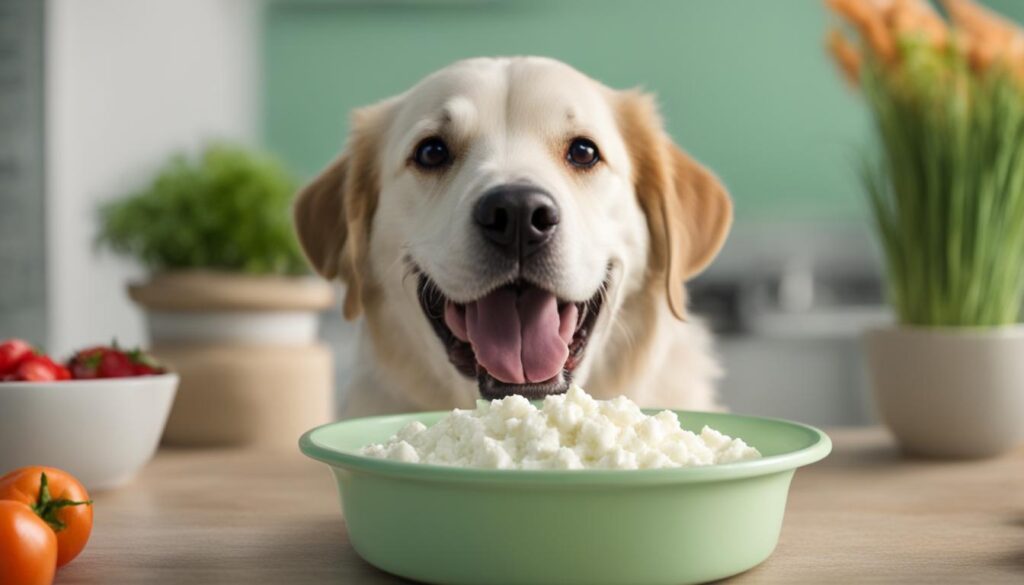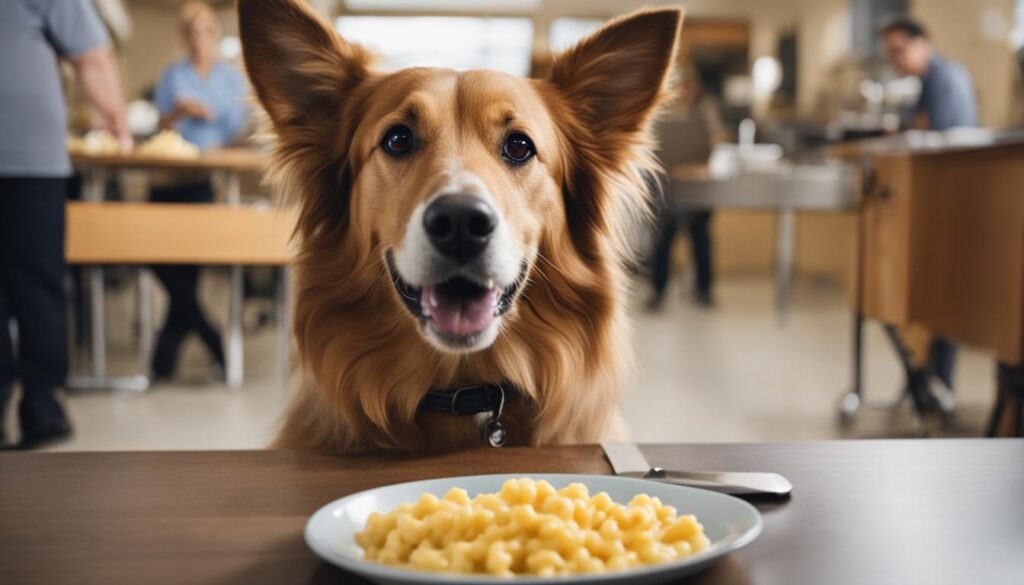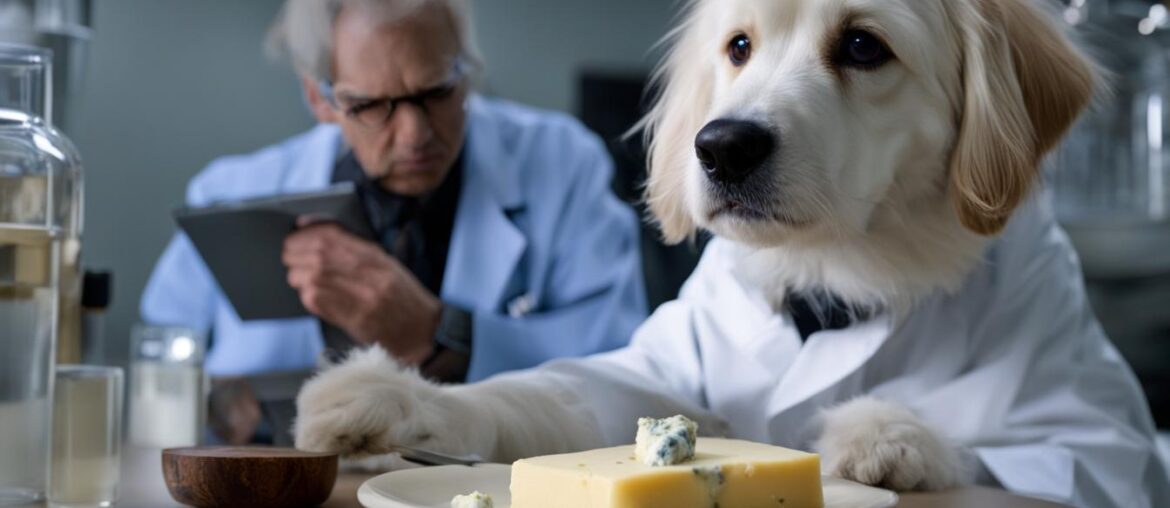When it comes to sharing food with our furry friends, it’s crucial to ensure their safety and well-being. As a responsible dog owner, you may wonder if blue cheese is a suitable treat for your canine companion. In this article, I will provide veterinary insights on whether dogs can eat blue cheese, the potential risks involved, and dog-friendly cheese alternatives.
Key Takeaways:
- Always check with your veterinarian before introducing new foods to your dog’s diet.
- Cheese can pose issues for dogs that are lactose intolerant or have sensitive stomachs.
- High amounts of saturated fats and salt in cheese can lead to health issues like obesity and pancreatitis.
- Choose low-fat, low-sodium, and preferably low-lactose cheeses for your dog.
- Blue cheese and certain other cheeses should be avoided due to their higher fat content and potential adverse effects on dogs.
Can Dogs Eat Cottage Cheese?

When it comes to feeding your dog cheese, cottage cheese is considered one of the better options. Not only is it tasty, but it also offers several health benefits for your pup. Cottage cheese is low in fat, low in calories, and has lower lactose levels compared to other cheeses. It is also rich in calcium and protein, making it a nutritious addition to your dog’s diet.
Choosing the right kind of cottage cheese is essential to ensure your dog’s safety and well-being. Opt for low-fat, no-added-sodium varieties to avoid any potential health risks. Some cottage cheese brands may contain high levels of sodium or additives that can be harmful to dogs. By selecting the appropriate cottage cheese, you can provide your furry friend with a nutritious treat without compromising their health.
If you’re uncertain about how your dog will react to cottage cheese, it’s always a good idea to introduce it gradually into their diet. Monitor their response to ensure there are no adverse reactions or digestive issues. Consulting with your veterinarian is also recommended, especially if your dog has any specific dietary restrictions or if you’re unsure about their lactose tolerance.
To summarize, cottage cheese can be a safe and healthy treat option for your dog. However, like with any new food, moderation is key. Use cottage cheese as an occasional treat and ensure that it is only a small part of your dog’s balanced diet. By following these guidelines, you can confidently share the joy of cottage cheese with your furry companion.
| Benefits of Cottage Cheese for Dogs | Risks and Considerations |
|---|---|
| Low-fat content | Potential high sodium levels |
| Low calorie content | Possible additives harmful to dogs |
| Lower lactose levels | Individual lactose tolerance may vary |
| Good source of calcium | Monitor for any adverse reactions |
| Rich in protein | Consult with a veterinarian in case of any dietary restrictions |
Overall, cottage cheese can be a safe and beneficial addition to your dog’s diet. Just remember to choose the right type, introduce it gradually, and always prioritize your dog’s individual needs and health. With careful consideration, you can treat your furry friend to some delicious cottage cheese without compromising their well-being.
Can Dogs Eat Cream Cheese?

Cream cheese can be a suitable option for dogs with lactose intolerances or sensitivities due to its low lactose content. However, it is important to be cautious when feeding cream cheese to your furry friend. While it may seem like a tasty treat, cream cheese is high in fat and can contain additives that are toxic to dogs.
Some cream cheese products may include ingredients such as chocolate, nutmeg, xylitol, garlic, and onion, which can be harmful to dogs. These additives can cause various health issues and should be avoided when selecting cream cheese for your pet.
To ensure the safety of your dog, it is best to avoid feeding them fatty cream cheese and opt for healthier alternatives instead. There are dog-friendly cheeses available that are lower in fat and do not contain any harmful additives. These alternatives provide a safer option for your dog to enjoy the taste and texture of cheese without compromising their health.
| Can I feed my dog cream cheese? | What should I consider? |
|---|---|
| Yes, in moderation | Choose low-fat cream cheese options |
| No, avoid feeding fatty cream cheese | Avoid cream cheese with harmful additives |
| Yes, opt for healthier alternatives | Choose dog-friendly cheeses without toxic ingredients |
When it comes to feeding your dog cream cheese, it’s essential to prioritize their well-being and make informed choices. Consult with your veterinarian for personalized recommendations based on your dog’s specific dietary needs and any potential sensitivities or intolerances.
Can Dogs Eat Mac and Cheese?

Feeding dogs mac and cheese is not a healthy choice for several reasons. Mac and cheese typically contains high levels of fat, sodium, preservatives, and additives. Boxed mac and cheese is highly processed, which may not be suitable for dogs’ digestive systems. While plain pasta in small amounts may be safe for dogs, a large serving of mac and cheese can upset their stomachs.
Furthermore, mac and cheese often includes ingredients that are toxic to dogs, such as garlic and onion. These ingredients can cause a variety of health issues, including gastrointestinal upset and even damage to red blood cells in certain cases. It’s important to note that even a small amount of these toxic ingredients can have adverse effects on dogs.
To ensure the well-being of your dog, it’s best to avoid feeding them mac and cheese. Instead, focus on offering healthier alternatives that are specifically formulated for dogs and meet their nutritional needs.
Healthy Alternatives to Mac and Cheese
While mac and cheese may not be suitable for dogs, there are plenty of other options that can provide a nutritious and tasty alternative. Here are a few examples:
- Plain cooked pasta without any sauces or seasonings
- Cooked and mashed sweet potatoes or pumpkin
- Steamed and cubed vegetables like carrots or green beans
- Lean and cooked meats, such as chicken or turkey
Remember, when introducing any new food to your dog’s diet, it’s important to do so gradually and in moderation. Monitoring your dog’s reaction and consulting with your veterinarian can help ensure that their dietary needs are met and that they stay happy and healthy.
| Mac and Cheese | Healthy Alternatives |
|---|---|
| High in fat and sodium | Low in fat and sodium |
| Contains preservatives and additives | All-natural ingredients |
| Processed and highly refined | Fresh and unprocessed |
| May include toxic ingredients like garlic and onion | Safe and dog-friendly ingredients |
Can Dogs Eat String Cheese?

String cheeses, especially skim mozzarella string cheese, can be lower in lactose and sodium compared to other cheeses. However, it is important to be cautious when feeding string cheese to your dog. The stringiness of the cheese can pose a choking hazard or cause intestinal blockage in dogs.
While string cheese may seem like a fun and interactive treat, it is crucial to choose the right type of string cheese and monitor your dog closely while they are consuming it. Make sure to cut the string cheese into small, manageable pieces to reduce the risk of choking. It is also advisable to supervise your dog while they enjoy their string cheese treat to ensure they don’t consume it too quickly.
Remember, every dog is different, and what may be safe for one dog may not be suitable for another. If you have any concerns or questions about feeding string cheese to your dog, it is always best to consult with your veterinarian for personalized advice.
| Nutrient | Amount per 1 oz (28g) |
|---|---|
| Calories | 85 |
| Total Fat | 6g |
| Saturated Fat | 3.5g |
| Cholesterol | 20mg |
| Sodium | 180mg |
| Protein | 6g |
| Calcium | 180mg |
| Lactose | Varies |
As shown in the nutritional information, string cheese can contain moderate levels of fat, sodium, and cholesterol. Therefore, it is best to feed string cheese to your dog in moderation and consider it as an occasional treat rather than a regular part of their diet.
Can Dogs Eat Cheese Puffs or Cheese Balls?

Cheese puffs or cheese balls are not a healthy choice for dogs. These types of snacks are high in lactose, preservatives, fat, and sodium, which can lead to various health issues. While a small amount may not be toxic, it is best to avoid feeding dogs cheese puffs or cheese balls altogether.
Feeding your dog cheese puffs or cheese balls can be harmful to their health. These snacks are typically highly processed and contain high levels of lactose, which can lead to digestive issues for dogs. They are also often high in fat, which can contribute to obesity and other weight-related health problems in dogs.
To further exacerbate the issue, cheese puffs and cheese balls usually contain preservatives and artificial flavors, which can be harmful to dogs. The high sodium content in these snacks can also pose a risk to your dog’s health, potentially leading to dehydration or other complications.
While a small nibble of a cheese puff or cheese ball might not cause immediate harm to your dog, it is recommended to avoid giving them these snacks altogether. Instead, focus on providing your dog with a balanced, nutritious diet that meets their specific dietary needs.
Always prioritize your dog’s well-being and consult with your veterinarian before introducing any new foods into their diet. They can provide guidance on suitable treats and snacks for your furry friend, ensuring they remain healthy and happy.
How to Safely Feed Cheese to Your Dog

When it comes to feeding cheese to your dog, it’s crucial to do it safely and responsibly. Here are some important guidelines to follow:
- Choose the Right Cheese: Opt for a low-fat, low-sodium, and preferably low-lactose cheese to minimize potential health risks. Consult with your veterinarian to determine which cheese is the best fit for your dog’s specific dietary needs and any potential lactose intolerance.
- Moderation is Key: Treats, including cheese, should only make up 10% of your dog’s overall diet. The remaining 90% should come from a balanced and nutritionally complete dog food.
- Portion Control: The portion sizes of cheese should be based on your dog’s size. Avoid overfeeding and adjust the quantity of cheese accordingly.
- Introduce Slowly: If your dog has never had cheese before, it’s advisable to introduce it gradually. Start with small amounts and monitor how your dog’s body reacts to it.
By following these guidelines, you can safely incorporate cheese into your dog’s diet as an occasional treat. However, remember that every dog is different, and it’s always best to consult with your veterinarian for personalized advice.
Benefits and Risks of Feeding Cheese to Dogs
Cheese can provide dogs with important nutrients such as protein, calcium, vitamin A, and essential fatty acids. These nutrients are essential for a dog’s overall health and well-being. However, it is crucial to consider the potential risks associated with feeding cheese to dogs.
Dogs that are lactose intolerant may experience digestive issues when consuming cheese. Lactose intolerance is the inability to digest lactose, a sugar found in milk and dairy products. Some dogs lack the enzyme needed to break down lactose, leading to symptoms such as bloating, gas, diarrhea, and stomach discomfort.
Additionally, cheese contains high amounts of saturated fats and salt. Excessive consumption of these can contribute to obesity, which is linked to a variety of health issues in dogs, including joint problems, heart disease, and decreased lifespan. The high salt content in cheese can also lead to increased blood pressure and kidney problems in some dogs.
To mitigate these risks, it is important to select the right type of cheese and feed it in moderation. Choose low-fat and low-sodium varieties of cheese to reduce the saturated fat and salt intake. It is also advisable to opt for cheeses with lower lactose content, such as cottage cheese or certain hard cheeses like Swiss, Parmesan, Cheddar, and Mozzarella.
Benefits of Feeding Cheese to Dogs:
- Source of protein: Cheese is a good source of protein, which is essential for muscle development and repair in dogs.
- Calcium: Many cheeses contain calcium, which is important for healthy teeth and bones in dogs.
- Vitamin A: Cheese contains vitamin A, which promotes good vision and a healthy immune system in dogs.
- Essential fatty acids: Cheese provides essential fatty acids, such as omega-3 and omega-6, which support the dog’s skin and coat health.
Risks of Feeding Cheese to Dogs:
- Lactose intolerance: Dogs that are lactose intolerant can experience digestive issues when consuming cheese due to the high lactose content.
- High saturated fat: Excessive consumption of cheese can contribute to obesity and related health problems in dogs.
- Elevated salt intake: The high salt content in cheese can lead to increased blood pressure and kidney problems in some dogs.
While cheese can be a tasty and nutritious treat for dogs, it is essential to feed it in moderation and consider any potential dietary sensitivities or health conditions your dog may have. Always consult with your veterinarian before making any significant changes to your dog’s diet.
| Type of Cheese | Benefits | Risks |
|---|---|---|
| Cottage cheese | Low in fat, good source of protein and calcium | Potential lactose intolerance |
| Swiss, Parmesan, Cheddar, Mozzarella | Lower lactose content, good source of protein and calcium | High in saturated fat |
| Feta, Brie, Provolone, Blue cheese, Goat cheese, Cream cheese | N/A | Potential lactose intolerance, high in saturated fat, high salt content |
Other Toxic Foods for Dogs to Avoid
In addition to blue cheese, there are several other foods that can be toxic or harmful to dogs. It is important to educate yourself about these foods and avoid feeding them to dogs to prevent potential health issues or poisoning.
| Toxic Foods for Dogs | Potential Health Risks |
|---|---|
| Chocolate | Can cause vomiting, diarrhea, increased heart rate, seizures, and even death. |
| Raisins | Can lead to kidney failure in dogs. |
| Xylitol (artificial sweetener) | Can cause a rapid drop in blood sugar levels, leading to seizures and liver failure. |
| Bones | Can splinter and cause blockages or damage to the digestive system. |
| Onions, garlic, leek, shallots, chives | Can damage a dog’s red blood cells, leading to anemia. |
| Macadamia nuts | Can cause weakness, vomiting, tremors, and hyperthermia in dogs. |
| Alcohol | Can lead to intoxication, decreased coordination, vomiting, and even death. |
It is essential to keep these foods out of reach and properly dispose of any leftovers or food waste that may contain them. If your dog accidentally ingests any of these toxic foods, contact your veterinarian immediately for guidance and potential treatment.
Remember, prevention is key when it comes to keeping your furry friend safe and healthy. By being aware of these toxic foods for dogs and taking the necessary precautions, you can help ensure your dog’s well-being.
Wrapping Up
After exploring the topic of feeding cheese to dogs, it is clear that while some dogs can safely consume cheese, there are potential risks that need to be considered. It is crucial to consult with your veterinarian before introducing cheese or any new food to your dog’s diet. Your vet can provide personalized advice based on your dog’s specific dietary needs, including any potential lactose intolerance.
When feeding cheese to your dog, it is important to choose low-fat, low-sodium, and preferably low-lactose options. Avoid cheeses with added ingredients or herbs/spices that may be harmful to dogs. Prioritizing your dog’s overall health and well-being should always be at the forefront of your decision-making when it comes to their diet.
Remember, moderation is key. Treats, including cheese, should only make up 10% of your dog’s diet, with the remaining 90% coming from a well-balanced dog food. Portion sizes should be based on your dog’s size to avoid overfeeding.
In conclusion, while cheese can provide dogs with certain nutrients, it is essential to be mindful of the potential risks and make informed choices. Your veterinarian is your best resource for ensuring that your dog’s diet is appropriate and supports their overall health and happiness.
FAQ
Can dogs eat blue cheese?
While blue cheese is not toxic to dogs, it is best to avoid feeding it to them. Blue cheese contains high amounts of saturated fats and salt, which can lead to health issues such as obesity and pancreatitis. It is safer to choose dog-friendly cheeses like cottage cheese, Swiss, Parmesan, Cheddar, and Mozzarella.
Can dogs eat cottage cheese?
Yes, dogs can eat cottage cheese in moderation. It is a good source of calcium and protein for dogs. However, it is important to choose a low-fat, no-added-sodium cottage cheese to ensure it is safe for your dog to consume.
Can dogs eat cream cheese?
Dogs can eat cream cheese in moderation, as long as it is low in lactose. Cream cheese with high fat content or additives that are toxic to dogs, such as chocolate, nutmeg, xylitol, garlic, and onion, should be avoided. It is best to opt for healthier alternatives.
Can dogs eat mac and cheese?
Feeding dogs mac and cheese is not a healthy choice. It is high in fat, sodium, preservatives, and often contains toxic ingredients such as garlic and onion. It is best to avoid feeding dogs mac and cheese and opt for healthier alternatives.
Can dogs eat string cheese?
Dogs can eat string cheese, especially skim mozzarella string cheese, in moderation. However, the stringiness of the cheese can pose a choking hazard or cause intestinal blockage in dogs. It is important to choose the right type of string cheese and monitor your dog while they are consuming it.
Can dogs eat cheese puffs or cheese balls?
Cheese puffs or cheese balls are not a healthy choice for dogs. These snacks are high in lactose, preservatives, fat, and sodium, which can lead to various health issues. It is best to avoid feeding dogs cheese puffs or cheese balls altogether.
How to safely feed cheese to your dog?
When feeding cheese to your dog, it is important to do so in moderation. Choose a low-fat, low-sodium, and preferably low-lactose cheese. Consult with your veterinarian about your dog’s specific dietary needs and any potential lactose intolerance. Portion sizes should be based on your dog’s size to avoid overfeeding. Introduce cheese slowly and monitor how your dog’s body reacts to it.
What are the benefits and risks of feeding cheese to dogs?
Cheese can provide dogs with protein, calcium, vitamin A, essential fatty acids, and other essential nutrients. However, it can cause issues for dogs that are lactose-intolerant or have sensitive stomachs. High amounts of saturated fats and salt in cheese can lead to obesity and other health issues in dogs. It is important to choose the right type of cheese and feed it in moderation to mitigate the risks.
What other toxic foods for dogs should I avoid?
In addition to blue cheese, some other toxic foods for dogs include chocolate, raisins, xylitol, bones, onions, garlic, leek, shallots, chives, macadamia nuts, and alcohol. It is important to educate yourself about these foods and avoid feeding them to dogs to prevent potential health issues or poisoning.






